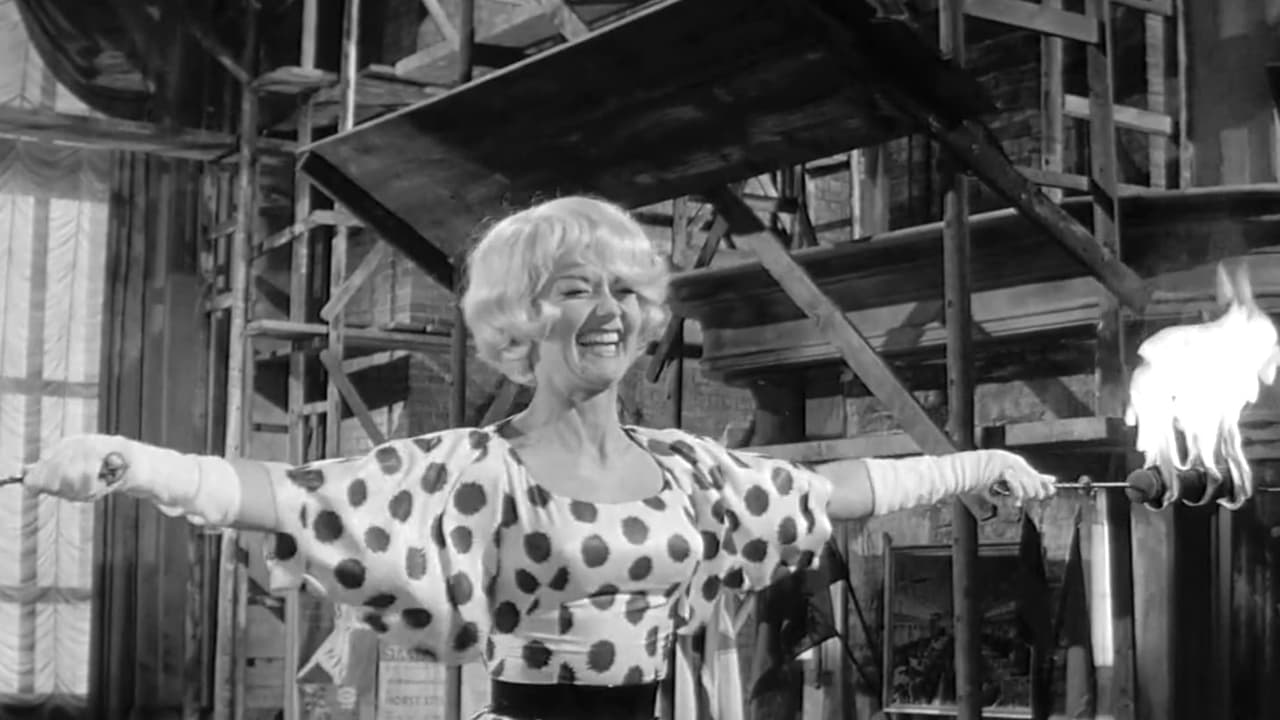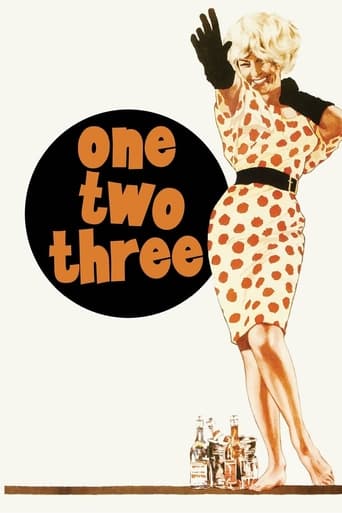

C.R. 'Mac' MacNamara (James Cagney) is a Coca-Cola exec in charge of the West Berlin operations. Tension is rising across the Iron Curtain. It's a little over a year before the start of the Berlin Wall. He's trying to introduce Coke to the East. The communists want the secret formula. There is his sexy secretary Fräulein Ingeborg. His wife wants a quiet life in Atlanta. His boss dismisses expanding into Russia and asks Mac to care for his clueless party-girl daughter Scarlett Hazeltine.The talk is fast-paced. The humor is broad and full of Wilder wordplay. Cagney is an unrelenting engine. He is buzzing with energy and I half-expected him to explode in song and dance. The machine gun dialog is non-stop and can get tiring at some point. This is a feat of performance from the great Cagney.
... View MoreHow the mighty have fallen! Here's a Billy Wilder farce loaded with gimmicks and some of his favorite predilections, but it just doesn't come off! Wilder's direction is too heavy-handed. Likewise, the acting is too earnest and enthusiastic for a script that should have been played with the light touch of a soufflé. What was needed was a group of players with a collective tongue-in-cheek air about them. Plus the ability to throw away lines. Because – let's face it! – the dialogue is just not very funny. Cagney's pow-pow-pow rendition is all wrong. True, Maurice Chevalier might have got away with this approach, but Jimmy Cagney is definitely not a Chevalier. Alas, the support players try hard too, and that's jut the trouble. Only Lilo Pulver knows the score and acts accordingly. You can scratch the rest of the cast. They all try hard too – and that's just the trouble! To cap it all, even the technical credits fail to impress. In fact, one might be pardoned for deducing that the movie had been heavily subsidized by a prominent soft-drink company.
... View MoreI'd like to buy the world a Coke. I'd like to teach the World to Sing (In Perfect Harmony) isn't what this movie is about. One, Two, Three is a cold war comedy film directed/written by Billy Wilder that makes fun of the Cold War tension. Supposedly, based on the 1929 Hungarian one-act play Egy, kettő, három by Ferenc Molnar, the movie has little to do with Molnar's source material, as Wilder add his own touch to the script. In many ways, Wilder borrow plot elements from his earlier films such as 1939 "Ninotchka', 1954's Sabrina, and others to get this movie, off the ground. Set in West Berlin during the Cold War, before the construction of the Berlin Wall, a high-ranking executive in the Coca-Cola Company, C.R. "Mac" MacNamara (James Cagney) is trying to introduce Coca Cola Operations into the Soviet Union; only for it to backlash, when an upper management, hot-blooded 17 year old daughter, Scarlett Hazeltine (Pamela Tiffin), his family was babysitting, fall in love with a young Communist extremist named Otto (Horst Buchholz). The film is known for its quick pace deliver of lines and action, and it shown with its writing and the music, it does use. Great use of the music from Aram Khachaturian, 'Sabre Dance'. You really get how energetic action, the movie will be. "Itsy Bitsy Teenie Weenie Yellow Polka Dot Bikini" during the interrogation scene was also hilarious. The movie also have clever sexual innuendos as you can tell that the conservative 1950s were ending, and the hip 1960s was about to start. The movie has a lot of politics about life as a communist, and capitalist. All of the jokes were mostly hit than miss for me. One joke even seeming to foreshadow, oncoming the Cuban Missile Crisis in 1962. The film also had a lot of inside jokes or references from a lot of James Cagney earlier films such as 1942's Yankee Doodle Dandy, 1931's Public Enemy and others. There also a joke about Cagney, himself with the whole idea of sent the money to unemployed cotton pickers of Mississippi. Cagney was accused of being a communist sympathizer for sending money to striking cotton workers in the 1930's. You can really see, how much work, the middle age James Cagney put into the film with his character. Billy Wilder feed him with so many lines that needed to be spoken in a fast pace, that he got overwhelm by the pressure. Add that with his declining health, Cagney decide to quit Hollywood for years after this film. It would be Cagney's last film appearance until 1981's Ragtime, 20 years later. Cagney during the production, had a hard relationship with co-star, Horst Buchholtz, as both of them openly disliked each other. Cagney believe that Horst Buchholz was overacting and scene stealing. While, Horst Buchholtz believe that Cagney was just being a big bully during the making of this film. In my opinion, I think Horst Buchholtz did a good job, and I think Cagney might overreacting to what Horst's character was saying, than the actor. The rest of the supporting cast was alright. Arlene Francis as Phyllis MacNamara got some great one liners, but somewhat comes off as too mean-spirited. Pamela Tiffin was indeed very attractive, but the badly done Southern drawl was bit nail-biting. The production also went through another trouble as locations had to be reshot due to the building of the Berlin Wall, and the crisis that was happening there. The crew and cast had to move to Munich to shoot the missing scenes. The building of the Berlin Wall during production badly hurt the film's marketing in Germany. It was very ill-received by German audiences and had minimal success during its initial run. The film does portray the Germans in a negative light. Still, I have to say, characters like Schlemmer (Hanns Lothar) & Fräulein Ingeborg (Liselotte Pulver) really did stood out. They really have some funny and sexy moments in the film. Another reason, why the Germans didn't like the film was because of Coca Cola. Coca Cola has a long love and hate relationship with Germany. Germany once banned sodas, as they deemed unsuitable for children due to its sugar content and additives. Also, they didn't want it to interference with the beer market that most adults drink at the time. Coca-Cola also adopted an apparent policy of ignoring the practice of eugenics and anti-Semitism by Nazi Germany. By the time, the Cold War came, Coke, took deep advantage of the situation by establishing new franchises in the newly liberated countries where many Germans saw as a threat to their culture. About the movie being about Coca Cola, it didn't hurt the film with its product placement. I didn't mind all the product placement, as long, as it felt like a movie, than a commercial. A few people did hatred that Coke was in the film, like actress Joan Crawford, whom at the time, was a board member of Pepsi. In an odd way, Coke was deem 'too American' for Communists, and Pepsi became the main exported soft drink to Eastern Europe for much of the Cold War after this film. The film was indeed banned from most Eastern European countries. One, Two, Three was even banned in Finland in 1962–1986 on "political" grounds — it was feared that the film would harm the relations between Finland and the Soviet Union. Overall: It's a very hot Cold War movie. A must-watch.
... View MoreAs usual,I don't want to write much about the story of this movie,because others have done that more than enough.The title of this movie-"one,two,three"-reminds you (surely not accidental) of military and let's you assume that this movie has a brisk tempo.After having watched this movie you will know that this assumption was fully justified! James Cagney is playing the choleric manager McNamara outstandingly.His play strongly reminds me of the French actor Louis de Funes,who played choleric characters so often and so convincingly.Also the other characters give a very good performance.The ever-obedient and submissive Schlemmer (Hans Lothar),the fanatic East German communist Otto Piffl (Horst Buchholz),Mc Namaras sexy secretary Fraulein Ingeborg (Liselotte Pulver),Mc Namaras sarcastic wife Phyllis (Arlene Francis),the members of the Soviet delegation...Yes,and also Pamela Tiffin.She played the "silly goose" Scarlett Hezeltine (the daughter of McNamaras boss in Atlanta),and she played her convincingly.Yes,some might not like this character,but that only proves that convincing play.I read that in the original English version she speaks with a deep southern accent,which,I presume,shall underline her character as a silly goose.Maybe that's why some people don't like Pamela Tiffin in this movie.But that's an internal matter of the U.S.I should say that in the German version of "one,two,three" the East German policemen speak with a Saxonian dialect,although the whole story takes place in Berlin and the policemen would be likely to speak the local dialect "Berlinerisch".Their Saxon dialect is a clear allusion to Walter Ulbricht,the East German political leader at that time,who spoke with a strong Saxon dialect.What concerns the national stereotypes in this movie: Yes,they are rather dumb for today.By the way,when laughing about the German's obedience in this movie you should be aware that West-Berlin (as well as East Berlin,of course) until 1990 was,different from West-Germany,a pure military regime,where,in principle,the allied commanders had nearly absolute power and the right to decide about everything (in practise the only did it if they saw a need,of course): Who had the right to enter West-Berlin,whether a hill could be used for military purposes etc. McNamaras reaction to the refusal of the West Berlin senate allowing a coca-cola vending machine in their building is an allusion to that...But don't forget that this movie is from 1961 and at that time the end of the war was only 16 and "Stalins" death only 8 years ago! And don't forget Billy Wilders personal biography.And don't forget,how,for example,South eastern Asians were portrayed in Hollywood at that time (Oh,God...)And especially-don't forget that this movie was made during the cold war.During the making of "one,two,three" unfortunately the Berlin Wall was erected (the movie mentions that at the beginning) This and all the ensuing personal tragedies surely didn't help promote this movie,and the dangerous showdown between U.S. tanks and Soviet tanks at the newly erected wall two months later eroded the interest in a parody of the cold war.To expect the people in Germany (and elsewhere) to laugh about "one,two,three" at the time the movie was released (end of 1961) is like to expect people in the U.S. and elsewhere laugh about a movie making jokes of Islamist terrorism at the end of 2001,shortly after 9/11.And don't forget,the horrific Cuban crisis was approaching in 1962.That's the reason,why "one,two,three" is not timeless.I think it's really difficult for younger people putting themselves into its atmosphere,to understand its countless allusions etc. without having experienced the cold war.At least you should have some basic knowledge about the political situation at that time,especially the one in Berlin.
... View More